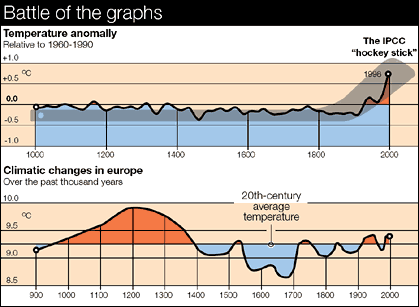
FROM- FINANCIAL POST
How Wikipedia’s green doctor rewrote 5,428 climate articles
By Lawrence Solomon
The Climategate Emails describe how a small band of climatologists cooked the books to make the last century seem dangerously warm.
The emails also describe how the band plotted to rewrite history as well as science, particularly by eliminating the Medieval Warm Period, a 400 year period that began around 1000 AD.
The Climategate Emails reveal something else, too: the enlistment of the most widely read source of information in the world — Wikipedia — in the wholesale rewriting of this history.
The Medieval Warm Period, which followed the meanness and cold of the Dark Ages, was a great time in human history — it allowed humans around the world to bask in a glorious warmth that vastly improved agriculture, increased life spans and otherwise bettered the human condition.
But the Medieval Warm Period was not so great for some humans in our own time — the same small band that believes the planet has now entered an unprecedented and dangerous warm period. As we now know from the Climategate Emails, this band saw the Medieval Warm Period as an enormous obstacle in their mission of spreading the word about global warming. If temperatures were warmer 1,000 years ago than today, the Climategate Emails explain in detail, their message that we now live in the warmest of all possible times would be undermined. As put by one band member, a Briton named Folland at the Hadley Centre, a Medieval Warm Period “dilutes the message rather significantly.”

Even before the Climategate Emails came to light, the problem posed by the Medieval Warm Period to this band was known. “We have to get rid of the Medieval Warm Period” read a pre-Climategate email, circa 1995, as attested to at hearings of the U.S. Senate Committee on Environment & Public Works. But the Climategate transcripts were more extensive and more illuminating — they provided an unvarnished look at the struggles that the climate practitioners underwent before settling on their scientific dogma.
The Climategate Emails showed, for example, that some members of the band were uncomfortable with aspects of their work, some even questioning the need to erase the existence of the Medieval Warm Period 1,000 years earlier.
Said Briffa, one of their chief practitioners: “I know there is pressure to present a nice tidy story as regards ‘apparent unprecedented warming in a thousand years or more in the proxy data’ but in reality the situation is not quite so simple. … I believe that the recent warmth was probably matched about 1,000 years ago.”
In the end, Briffa and other members of the band overcame their doubts and settled on their dogma. With the help of the United Nations Intergovernmental Panel on Climate Change, the highest climate change authority of all, they published what became the icon of their movement — the hockey stick graph. This icon showed temperatures in the last 1,000 years to have been stable — no Medieval Warm Period, not even the Little Ice Age of a few centuries ago.
But the UN’s official verdict that the Medieval Warm Period had not existed did not erase the countless schoolbooks, encyclopedias, and other scholarly sources that claimed it had. Rewriting those would take decades, time that the band members didn’t have if they were to save the globe from warming.
Instead, the band members turned to their friends in the media and to the blogosphere, creating a website called RealClimate.org. “The idea is that we working climate scientists should have a place where we can mount a rapid response to supposedly ‘bombshell’ papers that are doing the rounds” in aid of “combating dis-information,” one email explained, referring to criticisms of the hockey stick and anything else suggesting that temperatures today were not the hottest in recorded time. One person in the nine-member Realclimate.org team — U.K. scientist and Green Party activist William Connolley — would take on particularly crucial duties.

Connolley took control of all things climate in the most used information source the world has ever known – Wikipedia. Starting in February 2003, just when opposition to the claims of the band members were beginning to gel, Connolley set to work on the Wikipedia site. He rewrote Wikipedia’s articles on global warming, on the greenhouse effect, on the instrumental temperature record, on the urban heat island, on climate models, on global cooling. On Feb. 14, he began to erase the Little Ice Age; on Aug.11, the Medieval Warm Period. In October, he turned his attention to the hockey stick graph. He rewrote articles on the politics of global warming and on the scientists who were skeptical of the band. Richard Lindzen and Fred Singer, two of the world’s most distinguished climate scientists, were among his early targets, followed by others that the band especially hated, such as Willie Soon and Sallie Baliunas of the Harvard-Smithsonian Center for Astrophysics, authorities on the Medieval Warm Period.
All told, Connolley created or rewrote 5,428 unique Wikipedia articles. His control over Wikipedia was greater still, however, through the role he obtained at Wikipedia as a website administrator, which allowed him to act with virtual impunity. When Connolley didn’t like the subject of a certain article, he removed it — more than 500 articles of various descriptions disappeared at his hand. When he disapproved of the arguments that others were making, he often had them barred — over 2,000 Wikipedia contributors who ran afoul of him found themselves blocked from making further contributions. Acolytes whose writing conformed to Connolley’s global warming views, in contrast, were rewarded with Wikipedia’s blessings. In these ways, Connolley turned Wikipedia into the missionary wing of the global warming movement.

The Medieval Warm Period disappeared, as did criticism of the global warming orthodoxy. With the release of the Climategate Emails, the disappearing trick has been exposed. The glorious Medieval Warm Period will remain in the history books, perhaps with an asterisk to describe how a band of zealots once tried to make it disappear.
More...
No comments:
Post a Comment